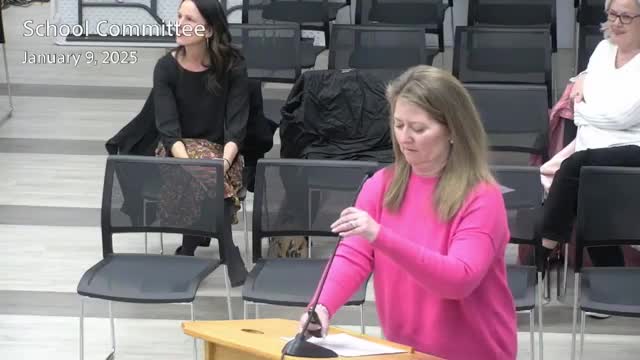Walpole Middle School outlines literacy strategy after MCAS review
Get AI-powered insights, summaries, and transcripts
Subscribe
Summary
Walpole Middle School presented steps to deepen comprehension, strengthen writing and align cross‑disciplinary literacy following MCAS data review.
Julia O'Rourke, humanities coordinator at Walpole Middle School, presented the middle school’s literacy priorities and responses to MCAS results during the Jan. 9 School Committee meeting.
O'Rourke said the department focused on four priorities after reviewing MCAS ELA and social studies data: deepen comprehension (beyond surface recall), strengthen writing stamina and transfer across disciplines, enhance cross‑disciplinary literacy and build critical reading skills. She described classroom strategies such as active annotation, Socratic seminars, text evidence tasks and literature circles.
O'Rourke said grade 6 now receives a semester course in informational reading and writing designed as a project‑based class where students practice roles such as blogger and journalist and learn digital literacy standards. She said the change was directed by the superintendent and intended to provide a stronger entry‑year foundation for the new middle school.
On interventions, O'Rourke outlined the school’s MTSS (Multi‑Tiered System of Supports). She said teachers use Tier 1 strategies (graphic organizers, sentence starters and leveled texts) to reach an estimated 80–85% of students, while Tier 2 interventions are delivered in six‑to‑eight week cycles by the full‑time Title I tutor and two reading teachers, sometimes as push‑in or pull‑out support. She noted that the NoRedInk writing program is funded with Title I dollars.
O'Rourke described assessment practices using IXL as the school’s benchmark diagnostic and learning platform; she highlighted that students have completed “over 1,000,000 ELA practice skills” across reading, writing, vocabulary and grammar domains and shared an example of a Grade 7 student who progressed to a Grade 9 level on the platform.
She also described professional learning activities, including a PLC using Keys to Literacy vocabulary routines attended by six of nine ELA teachers, and the adoption of strategies from Making Thinking Visible for formative classroom routines.
Committee member questions included confirmation that the informational reading and writing course is taken by all Grade 6 students as a semester course; O'Rourke confirmed it is part of the grade‑level rotation.
Ending: O'Rourke said she will continue to align vocabulary, reading and writing strategies across disciplines and to monitor IXL and MCAS data to guide instruction and interventions.
